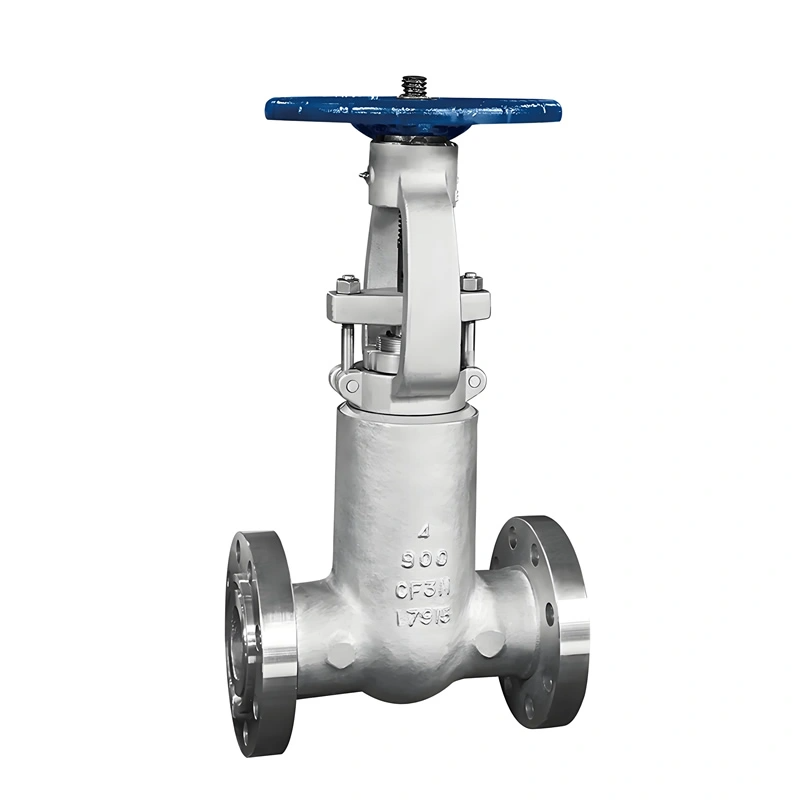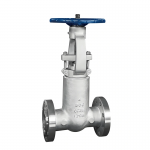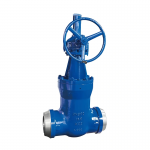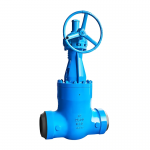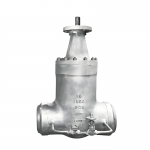Specification
Multiple LNG Industrial Flexible Wedge Full Bore Manual Pressure Steam Gate Valve
| Nominal size | 2″~24″(DN50~DN600) |
| Nominal pressure | Class 900~Class 4500(PN160~PN420) |
| Standard: | ASME B16.34 |
| Body material | Carbon steel, Stainless steel, Alloy steel, Duplex stainless steel |
| End connection | RF, BW, RTJ, |
| Operation | Manual, Pneumatic, Electric, Hydraulic |
Product Overview
I. Product Overview: Precision Control for High-Temperature Steam Systems
II. Key Attribute Parameters
| Parameter Category | Technical Specifications |
|---|---|
| Nominal Size Range | DN50-DN600 (NPS 2″-24″), with full-bore design for unobstructed flow |
| Pressure Class | Class 600-2500 (PN100-PN420), designed for high-pressure steam and gas applications |
| Temperature Range | -29°C to 540°C, depending on material selection (carbon steel, alloy steel, stainless steel) |
| Material System | – Body/Bonnet: ASTM A217 WC6, WC9, F22, F91; – Wedge: Flexible alloy steel with Stellite overlay; – Stem: A182 F6a (chrome-moly) |
| End Connections | RF/RTJ flanges (ASME B16.5), butt weld (ASME B16.25), threaded (NPT/BSP) |
| Operation Mode | Manual gearbox (bevel or worm drive), electric actuator, or pneumatic actuator options |
| Sealing Performance | Bubble-tight shut-off per API 598, fire-safe design per API 607 |
III. Core Features
-
Flexible Wedge Design
The split wedge design with precision-machined sealing surfaces ensures uniform contact with valve seats, minimizing wear and providing reliable shut-off even under thermal expansion or pipeline stress. The flexible structure accommodates minor misalignments and prevents jamming, extending service life in high-cycle applications. -
Pressure Seal Bonnet Technology
Unlike conventional bolted bonnets, the pressure seal design uses system pressure to enhance sealing integrity. As internal pressure increases, the bonnet seal tightens dynamically, eliminating leak paths and reducing maintenance needs. This makes it ideal for high-pressure steam systems where flange leaks could pose safety risks. -
High-Temperature Resistance
Valve components are crafted from heat-resistant alloy steels (e.g., F91, WC9) capable of withstanding prolonged exposure to superheated steam up to 540°C. Specialized heat treatment processes ensure dimensional stability and resistance to creep deformation under extreme thermal loads. -
Full Bore Flow Path
The full bore design minimizes pressure drop and turbulence, reducing energy consumption and improving system efficiency. This is critical for applications requiring high flow capacity, such as power plant main steam lines and refinery pipelines.
IV. Manufacturing Processes
-
Material Selection & Forging
Valve bodies are forged from ASTM A105 or alloy steel billets using precision die forging techniques, ensuring grain flow alignment with stress patterns. Forgings undergo ultrasonic testing (UT) and magnetic particle inspection (MT) to detect internal defects, with material traceability maintained through heat codes. -
Precision Machining
Critical surfaces (seats, wedges, stem threads) are machined to tolerances of ±0.02mm using CNC multi-axis milling and grinding centers. Sealing surfaces receive Stellite 6 hardfacing via automated plasma welding, providing hardness of HRC 48-52 and resistance to erosion, corrosion, and galling. -
Heat Treatment & Surface Finish
Components undergo controlled heat treatment cycles (normalizing, quenching, tempering) to achieve optimal mechanical properties. Final surface finishes include passivation for stainless steel parts and epoxy coating for carbon steel bodies, enhancing corrosion resistance in harsh environments. -
Stringent Testing
Each valve undergoes hydrostatic testing at 1.5x rated pressure for shell integrity and 1.1x for seat leakage, witnessed by third-party inspectors. Additional tests include fire-safe certification (API 607), low-temperature cryogenic testing (for LNG applications), and cycle life testing (5,000+ operations without failure).
Valve Details
V. Product Advantages
-
Reliability in Extreme Conditions
Field-proven performance in power plants and refineries, with valves maintaining zero-leakage operation for over 10 years in supercritical steam environments (540°C, 25 MPa). This reduces downtime and maintenance costs compared to conventional gate valves. -
Customization Capabilities
- Material Options: Tailored alloys for corrosive media (e.g., duplex stainless steel for seawater, Monel for brine);
- Specialized Coatings: Tungsten carbide overlay for abrasive slurries, nickel plating for sour gas applications;
- Actuation Solutions: Electric actuators with Modbus communication, pneumatic actuators with fail-safe options.
-
Compliance with Global Standards
Certified to ASME, API, ISO, and EN standards, with additional approvals for nuclear (ASME BPVC Section III), marine (ABS/LR), and fire-safe applications. This ensures seamless integration into international projects. -
Cost-Effective Lifecycle
Reduced maintenance requirements (no bonnet gasket replacement, fewer leak repairs) and extended service intervals lower total cost of ownership. The full bore design also minimizes energy consumption over the valve’s lifespan.
Application
VI. Application Fields
-
Power Generation
- Main steam isolation valves in coal-fired, gas-fired, and nuclear power plants;
- Boiler feedwater systems and turbine bypass lines;
- High-temperature, high-pressure steam distribution networks.
-
Petrochemical Industry
- Refinery distillation columns and catalytic cracking units;
- High-pressure hydrogenation reactors and steam methane reformers;
- LNG processing and transportation facilities.
-
Chemical Processing
- High-temperature reactor inlet/outlet valves;
- Steam tracing systems for viscous fluids;
- Corrosive media handling (acids, alkalis).
-
Marine & Offshore
- Shipboard steam propulsion systems;
- Offshore platform power generation and process systems;
- Subsea pipeline isolation (with subsea actuation packages).
RELATED
-

High Temperature/Pressure 304 Stainless Steel Resistant Manual Power Forged Three Piece Flanged Floating Ball Valve
TIANYU 304 Stainless Steel Flanged Floating Ball Valve: Corrosion-Resistant Full-Port Flow Control Solution for Industrial, Sanitary, and Municipal Me…
BALL VALVE 11/03/2025 -

API ANSI 2in-16in DN50-DN400 PN10 PN16 CF8M Pneumatic Flanged Floating Ball Valve
TIANYU CF8M Pneumatic Flanged Floating Ball Valve: 2in-16in (DN50-DN400) PN10-PN16 API/ANSI Class Corrosion-Resistant Flow Control Solution for Indust…
BALL VALVE 11/01/2025 -

Large-Diameter DN1400 CLASS150 WCB SS Triple Eccentric Metal-Sealed Hard Seal Butterfly Valve
TIANYU DN1400 (56″) CLASS 150 WCB Hard Seal Butterfly Valve: Triple Eccentric Metal-Sealed Flanged Valve for Large-Diameter Industrial Media wit…
BUTTERFLY VALVE 10/30/2025 -

PN16 Stainless Steel Floating Ball Valve: Full Port 2PC Flange-Connected Valve with Fire-Safe & Anti-Static SS Ball Valve
TIANYU Stainless Steel Floating Ball Valve: Full Port 2PC Flange-Connected Valve with Fire-Safe & Anti-Static Design for Oil, Gas, and Industrial …
BALL VALVE 10/29/2025 -

High-Performance DN80 Class 150 WCB Soft-Sealed Lug-Type Double Eccentric Butterfly Valve
TIANYU 3” Class 150 WCB lug-type double eccentric butterfly valve is a technologically advanced flow control device engineered to address the challeng…
BUTTERFLY VALVE 10/25/2025 -

DN125 PN16 CF8M Stainless Steel Lug-Type Butterfly Valve with PTFE Lining Concentric Line Butterfly Valves
TIANYU DN125 PN16 CF8M stainless steel lug-type butterfly valve is a precision-engineered flow control device designed to address the challenges of ha…
BUTTERFLY VALVE 10/25/2025


